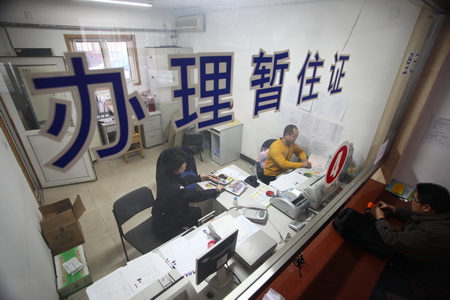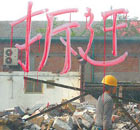Top Biz News
New permits expected to improve lives of migrants
By Jin Zhu and Wang Ru (China Daily)
Updated: 2010-01-26 09:04
 |
Large Medium Small |
 |
|
A man applies for a temporary residence permit yesterday in Beijing. [China Daily] |
Migrant workers and skilled workers are expected to benefit from a change in the resident permit system in Beijing, an expert said.
Beijing launched its temporary resident permit policy in 1985. There are now six million registered migrants in the city, making up 30 percent of the population.
"The temporary residence permit system has long been criticized as a form of discrimination. It lags far behind the city's development," said Xiao, also a member of the Beijing municipal committee of Chinese People's Political Consultative Conference Committee (CPPCC).
With new residence permits, migrants should benefit from more rights and favorable policies, such as social security, medical care, and housing, Xiao said.
A residence permit also entitles the owner to an equal status in education fees, the right to buy economically affordable apartments, and a significantly easier procedure to obtain a pass into Hong Kong and Macao.
In addition, it is a great chance for the government to guide migrants to live in areas with lower population density, he added.
"The population is unevenly distributed in the city now, especially in northern areas such as Wangjing in Chaoyang district, and Tiantongyuan and Shahe in Changping district," Xiao said.
"Working out a district quota system will promote the city to attain a uniform distribution of its population," he added.
So far, the new resident permit policy has been well developed in some coastal cities, such as Dongguan, Zhuhai, Shenzhen, and Foshan.
However, the process in Beijing will meet with more difficulties, said Lu Jiehua, a professor of sociology at Peking University.
"It is better to benefit only some migrants with favorable policies and rights first. The focus needs to be on how many years they have lived in the city," Lu said.
Those in demand for the city's development, such as experienced nannies or graduates in bio-engineering, are likely to benefit first, Xiao said.
"But for graduates from other parts of the country, the permit would still be hard to get," Xiao warned.














